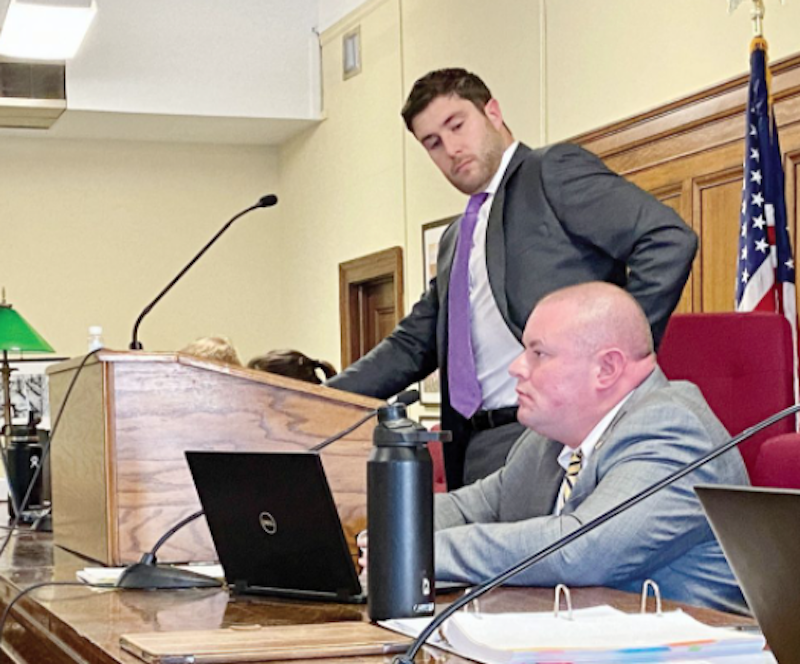By Steven Allen Adams
Parkersburg News and Sentinel
CHARLESTON, W.Va. — Del. Brandon Steel, the chairman of the House Government Organization Committee, is pushing a bill once again to move legal advertisements online to save local governments money and be more transparent. Opponents say the opposite will happen.
Steele, an attorney and owner of online southern West Virginia news website Lootpress, took up House Bill 4260 in committee Wednesday afternoon. It was approved by voice vote and heads to the House Judiciary Committee for further

HB 4260 would establish a centralized website clearinghouse for county and municipal legal advertisements, requiring the State Auditor’s Office to build and maintain the site. The bill would require the State Auditor to create an electronic affidavit for legal advertisers to show proof that the legal ad was published on the new website
The bill would reduce time limits for certain kinds of legal ads to remain published in newspapers before being pulled down depending on if the legal ad was also published on the state legal ad website, though legal ads could live either permanently on the central website or be archived and searchable.
“By passage of this bill, would I still receive the notice in a newspaper? If it’s still coming one week, it’s still in the paper,” Steele said during questioning of Stephen Conley, deputy state auditor and legal counsel for the State Auditor’s Office. “As it came to your website, you could put it in a format over the next year in which it would be searchable.”
Bills dealing with changing how legal ads are handled in West Virginia have been introduced every year since 2019, attempting to create alternative means of publication. The Legislative Auditor’s Office released a report that same year claiming that city, county and state governments would save money by submitting legal advertisements to a centralized free website managed by the state, as well as give West Virginian’s more access to legal advertisements.
A bill passed last year, Senate Bill 642, already requires a central website for state-level legal notices. Conley said his office is on track to have the website up and running for July 1. According to a fiscal note, the bill would cost the State Auditor’s Office a one-time cost of $15,000.
That’s significantly less than the approximately $800,000 the office spends annually on legal ads for delinquent land notices, though it was unclear how much of that is recouped from fees. Conley said reducing the required time limit to publish legal ads would be a significant saving for the State Auditor’s Office.
“We spend almost $1 million a year on legal notices,” Conley said. “This is a complete estimate, but if we’re spending $800,000, I’m going to guess it probably would cut it down to (between) $200,000 to $300,000.”
According to state code, legal advertisements are notices, statements, information or other matters required by law to be published. While legal advertisements in newspapers are not free, many local governments make back the money spent on legal advertisements through fees.
Opponents of these bills, such as the West Virginia Press Association (of which this newspaper is a member), claim that reducing the time that certain legal notices can remain published if they’re also submitted to the centralized website would reduce public transparency, not increase transparency. Another issue is the lack of access to high-speed broadband in certain parts of the state, making ready access to a centralized website difficult.
“Legals come from government bodies; local government bodies and state government bodies,” said Don Smith, executive director of the West Virginia Press Association. “By having a newspaper, the legal is in where the coverage is. If the county commission is going to place a legal and you follow the county commission, you want to see the county commission story … and the related legal is there to see.”
According to the Public Notice Resource Center, requiring legal ads through newspapers is a way of providing independent, third-party confirmation that the legal ads have been placed, providing a valuable tool alongside opening meetings and Freedom of Information Act requests to help keep government and public officials accountable.
“Additionally, it’s put into the community and there is community awareness and what we call family awareness, because if your name ever shows up in a tax list where you haven’t paid your taxes, your family calls you,” Smith said. “That’s the kind of thing that happens with newspapers, because it’s in the community that is impacted.”
The West Virginia Press Association already offers a website, wvlegals.com, where state newspapers can upload legal advertisements.
House Minority Leader Doug Skaff, D-Kanawha, is the president of HD Media, owners of the Charleston Gazette-Mail, Huntington Herald-Dispatch, and several weekly newspapers in southern West Virginia. Skaff, also a member of the House Government Organization Committee, said lawmakers should wait and see how the legal ad website works with state legal notices before making further changes to local legal ads.
“I don’t understand why we have to not make it a companion to something that is working in the state, that could disenfranchise people in West Virginia,” Skaff said. “We should only continue to expand the reach of communicating to our people, not potentially diminish it. We still have concerns of will people willingly go to a state-ran website to check that second and third notice when they could catch it a second or third time in a paper.”
Steven Allen Adams can be reached at [email protected]
See Newspaper coverage:
https://www.newsandsentinel.com/news/local-news/2022/01/republican-lawmakers-in-west-virginia-target-legal-ads/





